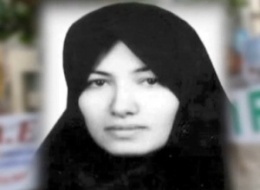 In Iran, a woman convicted of adultery can be buried up to her chest and stoned to death by her village... in 2010. We're not talking about being plummeted by a rock that would cause death instantaneously. We're talking about being pelleted by rocks that can inflict pain and physical damage, but nevertheless a slow, painful death. Since 1986, Iran has reported 26 cases of women being stoned to death- this does not included undocumented cases.
In Iran, a woman convicted of adultery can be buried up to her chest and stoned to death by her village... in 2010. We're not talking about being plummeted by a rock that would cause death instantaneously. We're talking about being pelleted by rocks that can inflict pain and physical damage, but nevertheless a slow, painful death. Since 1986, Iran has reported 26 cases of women being stoned to death- this does not included undocumented cases.Such is the case for 42 year old mother of 2, Sakineh Mohammadie Ashtiani (pictured). Ashtiani, who does not speak Farsi but Turkish, was convicted of adultery in 2006 and received 99 lashes (after which a forced confession was taken). Recently acquitted of murdering her husband, she now faces the punishment of stoning.
Only international pressure can help Sakinah Ashtiani. Mina Ahadi, who heads the International Committee Against Stoning and the Death Penalty told CNN: "Legally it's all over. It's a done deal. Sakineh can be stoned at any minute." U.S. Assistant Secretary of State P.J. Crowley said Thursday. "For a modern society such as Iran, we think this raises significant human rights concerns."
In 2008, the film "The Stoning of Soraya M." was released, gaining laurels from Toronto and Los Angeles film festivals. The movie was based on the true life events told to French-Iranian journalist, Freidoune Sahebjam, that surrounded Soraya Manutchehri, who was falsely accused by her husband and stoned to death by her village.
Sounds like Iran needs a Feminist movement to shake things up a bit. For now, reach out to organizations like Mina Ahadi's International Committee Against Stoning and the Death Penalty (http://stopstonningnow.com/) and Amnesty International (http://www.amnesty.org/en/news-and-updates/report/campaigning-end-stoning-iran-20080115).




1 comment:
I know it’s painful for any person to feel the way Sakina does, especially as she thinks of her children. I’m sure she regrets what has happened to her, and hates the punishment and wonders why it’s so harsh. I can feel for her. However, you did not post the whole story, the part where her re-trial was due to the involvement of the person with whom she committed adultery being the killer of her husband.
Should there be no consideration to both sides of the story? Rather than asking herself the question: "Many nights, before sleeping, I think to myself how can anybody be prepared to throw stones at me; to aim at my face and hands? Why?”
Perhaps the question should be about what her action sets as an example to others around her;
(a) the action she took before she was discovered to have sinned
(b) the one that she may have participated in directly or indirectly (i.e.: her husband being killed), by her lover no less, and,
(c) the action she is about to endure (the stoning)
There is no doubt that sin will continue to occur in society even when punishment is set as an example; certainly, it will happen far less frequently. So I support punishment, and I am hopeful that if I commit sin and that society decides to punish me that I will contemplate it in the following way:
To spend the time one has to repent. After all whatever you believe in, there are consequences to every action, and whether you believe in a God or not, such repentance allows everyone to become peaceful with themselves and with each other, instead of the animosity being raised by these counter arguing articles. There is Mercy to be had here, but you must allow such mercy to show itself through the example of consequence for action
Also, the published articles, even by so called Amnesty Organizations, is deplorable - Has it gotten so bad that it is important enough to ignore that a man (her husband) was killed? Could she not have been a part of some unbiased circumstance/action that was less than defensible as it related to him? The biased one-sided-ness of these article is what I object to - It is so one-sided aiming only to shine light on Shari’a Law as if it is a barbaric system, with antiquated roots. Incredulous…!!!
Everyone creates and manages laws to preserve the sanctity of family and society in their own communities, and they evolve laws to fit the crime. It is okay to punish someone with capital punishment for killing a child in the Western World, but it is not okay to have someone take action that will destroy the social fabric slowly but surely. Why try and impose one’s laws upon another community in the name of Civility, when it is that very same civility that you are not willing to consider furnishing to the same party you are demanding it from?
May we all have the foresight and be granted the Grace to stay in God's Mercy and Guidance - Al7amdulilah!
Post a Comment